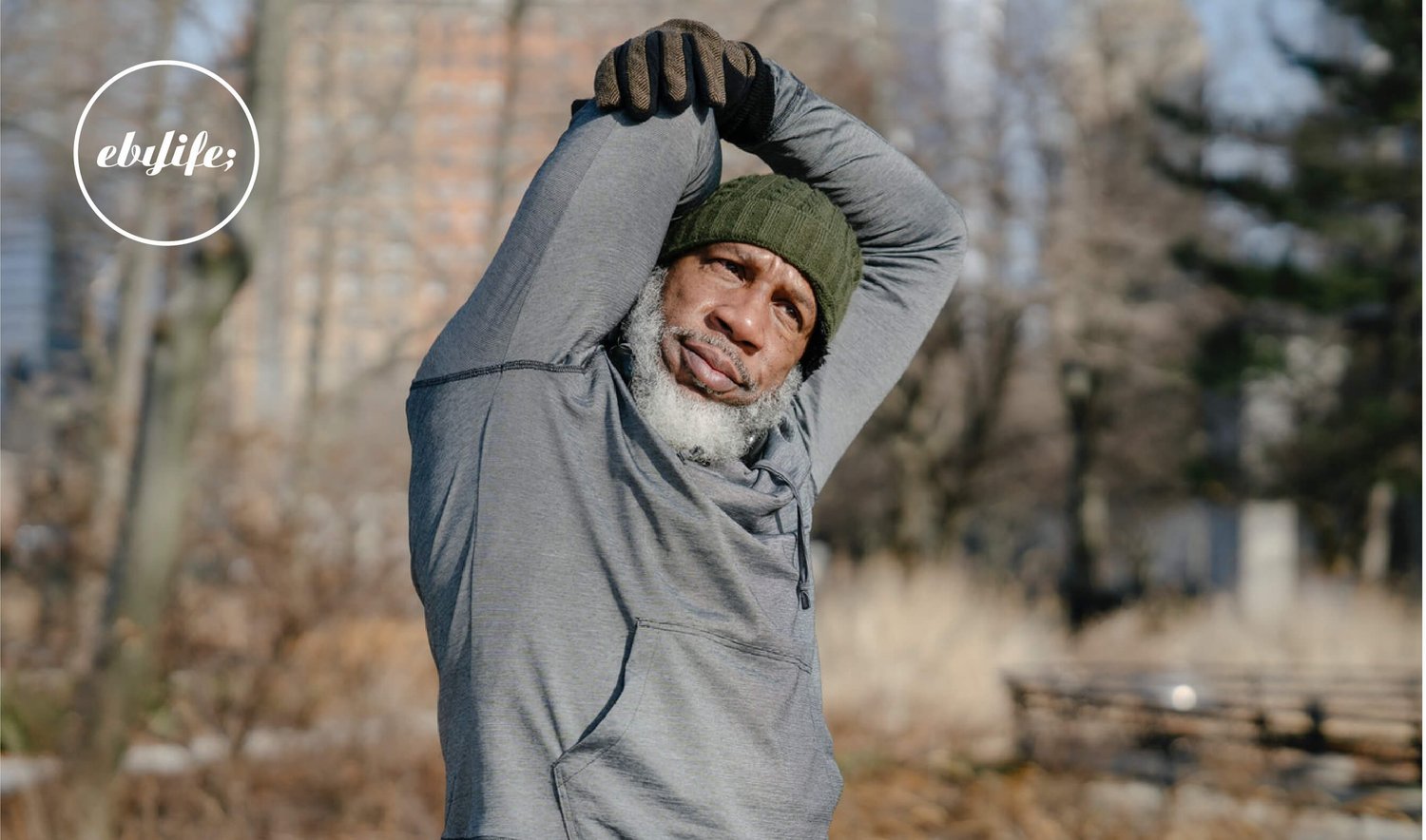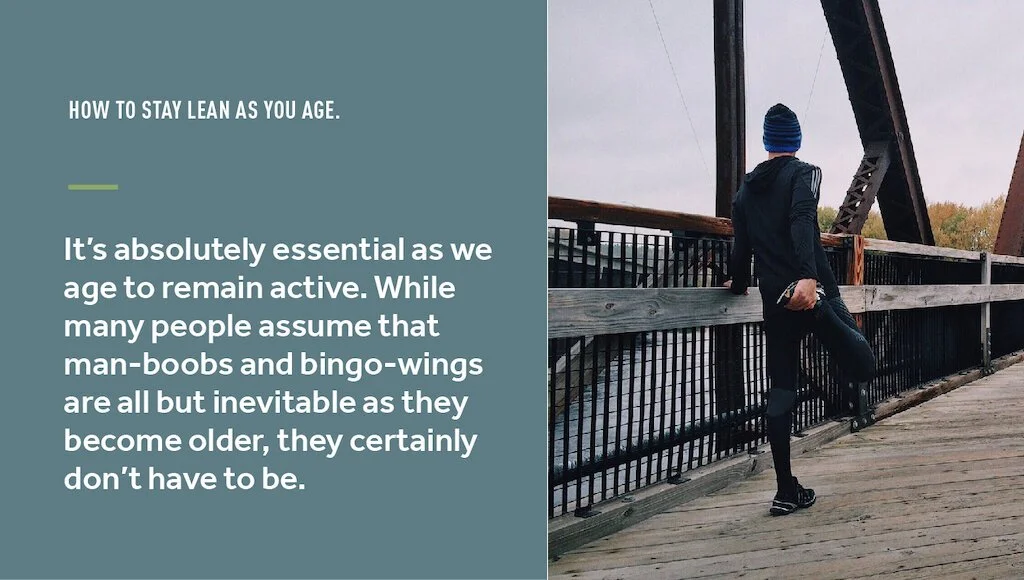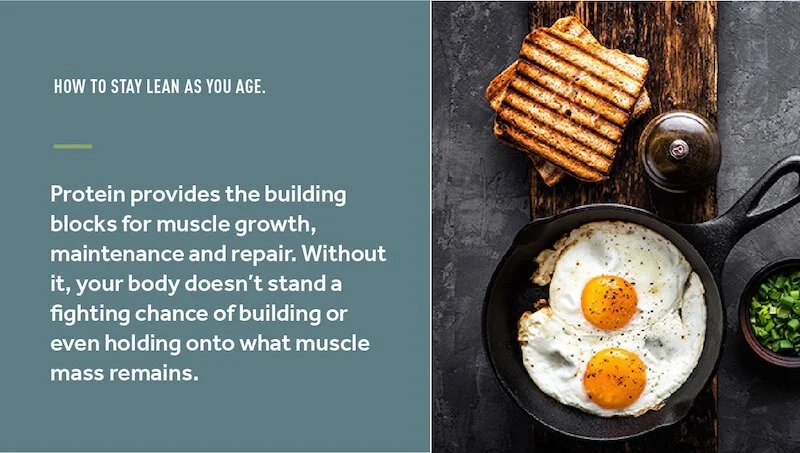How to Stay Lean as you age
By Martin Ebner (updated 21/06/21)
How great would it be to be a kid again!? Scoffing your face with copious amounts of junk food without a care in the world. I can only presume if you’re taking the time to read this article, you are no longer in the so-called “prime of your life”? Fear not, we’re in it together!
As a personal trainer, one thing my clients all have in common is their real struggle to stay lean as they age past 35. Confused and frustrated that despite their best efforts to exercise regularly and eat right, losing weight and keeping trim is not nearly as straightforward or effortless as it once was. One thing that almost all of my clients say when they start training with me is “when I was young/er, I could eat whatever I wanted and not gain weight!”. While this is probably somewhat true, it’s also a slight fallacy as we humans have the tendency to sugar-coat past memories.
The sad truth is, as we age, our metabolism slows down causing for most, a very gradual but frustrating increase in body fat with less capacity to lose it. Along with a decelerating metabolism, energy levels decrease and with that, the ability to exercise as frequently and intensely as we could in our teens and twenties. The less active we become the more likely we are to lose muscle mass. This directly affects our BMR (Basal metabolic rate) - the amount of energy (in the form of calories) that the body needs to function. Unfortunately, as muscle mass decreases as does the body’s natural calorie-burning ability. Weight management is based on calorie requirements and if you exercise less frequently and at a lower intensity, your calorie requirements should be relative to your current age and activity level, not that of your 18-year-old self.
Now. Despite what seems like an inevitable plunge into plumpness, there are many steps that can be taken to prevent or at the very least pump the brakes on a slowing metabolism and weight gain as we age. Let's take a look at some of the most effective methods.
Stay active
It’s absolutely essential as we age to remain active. While many people assume that man-boobs and bingo-wings are all but inevitable as they become older, they certainly don’t have to be. While admittedly life becomes more complicated with busier schedules, heavier workloads and an abundance of family and social commitments, It’s imperative to not only your waistline to stay active but to your energy levels, well-being and longevity too.
Lift weights
One of the best things you can do to keep your metabolism revved up as you age is to get involved in some form of strength training (at least a couple of times a week).
As we age, there is a natural decline in the body’s production of hormones (Estrogen, testosterone and human growth hormone) which can result in a decrease of muscle mass. Resistance training can slow down these effects and even help build new muscle.
Muscle cells burn much more calories than fat cells do, therefore it pays dividends to your waistline and body composition to regularly incorporate strength training into your exercise routine.
Related article: 10 things you need to know about building muscle
Try Fasted and moderate-intensity cardio
There are a couple of ways of exercising to trick your body into burning more fat.
Fasted cardio: A method of training in which your body is depleted of carbohydrates and glycogen stores (energy). When this happens, your body begins to burn fat as fuel to power you through your workouts. As a general rule, you’ll need around 8 hours after your last meal to enter a fasted state. If you do decide to incorporate fasted cardio into your weekly routine, you may want to consider taking a BCAA supplement to give your muscle a little extra protection and oomf during your workouts.
Read more: Fasted Cardio: What is it? Is it best for Fat burning?
Moderate intensity cardio Another great method of training for fat burning. By exercising at around 70% of your body’s maximum heart rate (220 minus your age) your body can more effectively break down fat to be used as energy.
Eat protein
Along with strength training, it’s vitally important to eat adequate amounts of protein. Protein provides the building blocks for muscle growth, maintenance and repair. Without it, your body doesn’t stand a fighting chance of building or even holding onto what muscle mass remains.
Remember, the more muscle you have, the faster your Basal metabolic rate will be. This means your body’s ability to burn calories when resting is elevated. Not so fast man boobs and bingo wings!
If you’re concerned that you’re not able to get enough protein from diet alone, you may want to consider taking a protein supplement to help you hit your daily macronutrient goals.
As a rough guide, aim to consume 1-2g of protein per kilo of body weight. Healthy protein sources include lean meat, fish, legumes, nuts and seeds, soy products, healthy whole grains and protein-rich vegetables.
Related: The ripped Vegan
Careful with Carbs and Fat
While both are extremely important and essential for a healthy and balanced diet, it’s important not to go overboard with Carbs and fat. While fat is the most satiating of the macronutrients, it contains a whopping 9 calories per gram. That's more than double the 4 calories per gram from carbohydrates and protein. Carbohydrates, while low in calories, can be very easy to overconsume. Unfortunately, any carbohydrates that you can’t immediately use for energy, is stored as glycogen in the liver and muscles or as fat. Protein on the other hand can’t be stored for later use so any excess is excreted.
Reduce your calories according to your age and energy expenditure
If you continue to exercise regularly you shouldn’t have to adjust your calorie consumption too much. Your body’s ability to burn calories doesn’t slow overnight, despite it feeling that way. This means that as you age, with regular exercise that includes both strength and cardiovascular training, you shouldn’t have to reduce your daily calorie consumption by more than 200 calories for every decade past the age of 30. An average 20-year-old active male requires around 2500 calories per day to maintain body weight (500 calories less for women). This means that men in their 30s should aim to consume no more than 2300 and women, 1800 calories. For every decade, reduce this figure by 200 calories.
As you age and your calorie consumption is reduced, if you feel an inability to get everything that your body needs to thrive from diet alone, you may want to consider taking a Multivitamin and mineral supplement as a safety net.
Sleep more
As if you needed another excuse to hit the snooze button! Sleep not only improves our motor-skill learning, memory, sporting performance, stamina and mood, but studies also show that 8-hours sleep a night helps combat obesity in adults. The 2 hormones that control appetite and weight are Leptin (which tells your brain you're full) and Ghrelin (which tells you to eat). Unfortunately the latter, Ghrelin increases when we’re under-slept which can result in an average consumption of an extra 200-300 calories per day. To put that into context, that's around 70,000 calories a year or 10-15 lbs weight gain!
Related articles: How sleep affects athletic performance and Sleep Lab Pro review
Conclusion
Weight gain and aging don't have to go hand in hand unless of course, you allow them to!
Yes it’s harder than it once was to stay lean and yes it requires more care, attention and commitment but the first step to preventing age-related weight gain is education. Once you know what to do and how to prevent it, you can make the necessary changes to your diet, lifestyle and exercise plan so that you too can age healthy, happy and weight-gain-free!
Related Article: The 5 best Stimulant Free fat burners for men and women




